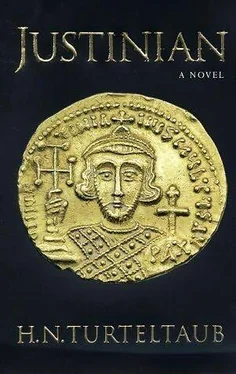Harry Turtledove - Justinian
Здесь есть возможность читать онлайн «Harry Turtledove - Justinian» весь текст электронной книги совершенно бесплатно (целиком полную версию без сокращений). В некоторых случаях можно слушать аудио, скачать через торрент в формате fb2 и присутствует краткое содержание. Жанр: Историческая проза, на английском языке. Описание произведения, (предисловие) а так же отзывы посетителей доступны на портале библиотеки ЛибКат.
- Название:Justinian
- Автор:
- Жанр:
- Год:неизвестен
- ISBN:нет данных
- Рейтинг книги:3 / 5. Голосов: 1
-
Избранное:Добавить в избранное
- Отзывы:
-
Ваша оценка:
- 60
- 1
- 2
- 3
- 4
- 5
Justinian: краткое содержание, описание и аннотация
Предлагаем к чтению аннотацию, описание, краткое содержание или предисловие (зависит от того, что написал сам автор книги «Justinian»). Если вы не нашли необходимую информацию о книге — напишите в комментариях, мы постараемся отыскать её.
Justinian — читать онлайн бесплатно полную книгу (весь текст) целиком
Ниже представлен текст книги, разбитый по страницам. Система сохранения места последней прочитанной страницы, позволяет с удобством читать онлайн бесплатно книгу «Justinian», без необходимости каждый раз заново искать на чём Вы остановились. Поставьте закладку, и сможете в любой момент перейти на страницу, на которой закончили чтение.
Интервал:
Закладка:
"Ah," Tervel said. "He can afford to be Apsimaros's friend. The Khazars have no borders with the Roman Empire. We Bulgars do. We have never been friends with the Emperors of the Romans: not with Constantine, not with Justinian"- one eyebrow lifted ironically-"not with Leontios, not with this Apsimaros, either." He folded his arms across his chest, waiting to see what I would say next.
"That will change, if an Emperor of the Romans owes his return to his throne to the khagan of the Bulgars." I was careful to use the indicative, not the subjunctive, Tervel having shown he grasped subtle shades of meaning.
"Taking Constantinople would not be easy." He used the subjunctive. "My countrymen who have seen the city do nothing but talk about how strong its walls are."
"Apsimaros got into the city," I returned. "I too shall find a way."
"Maybe," he said. "Maybe." He stretched, lithe as a wildcat. "I need not decide this at once. Drink and eat with me, and tell me of how you came here from Kherson. Unless I am wrong, this will be worth hearing."
Clapping his hands together, he shouted for slaves. Like the others I saw in the country of the Bulgars, they were Romans, poor souls. They brought us roast mutton and wine, the khagan preferring it to his people's native strong drink.
Tervel had me speak in some detail on the repair of my nose, the Bulgars being more ignorant of surgery of any sort than we Romans. "Do you think you could teach my people to cut so?" he asked when I was through.
"I doubt it," I answered. "I paid as little attention as I could to what Auriabedas was doing to me. Myakes here watched. He'd have a better notion of how the operation was done than I do."
"Not good enough to teach it to anybody else," Myakes said quickly. "What I was trying to do was not to puke."
"Too bad," Tervel said. "Noses get lopped often enough, it would be worth knowing what this foreigner with the name I cannot say did. But go on, Justinian."
I told of traveling to the court of Ibouzeros Gliabanos, and of my marriage to Theodora, with which he had shown himself somewhat familiar. Then I spoke of my journey to Phanagoria, of the khagan's betrayal, and of how I had dealt with Papatzun and Balgitzin. Tervel and the other Bulgars who understood Greek clapped their hands at that.
I also told them of how God had chosen to spare me out on the sea as I was sailing to their land, finishing, "And so you see, O Khagan, I am truly destined to enter the Queen of Cities and avenge myself on all who wronged me."
"So you say," Tervel replied, voice betraying nothing. He was no more a Christian than Ibouzeros Gliabanos- less, in fact, for the khagan of the Khazars tolerated all faiths, including the true one, in the lands he ruled, while the Bulgars saw Christianity as connected with Roman rule, and so suspect.
"With your help or without it, I am going on to Constantinople," I said.
"I believe you," Tervel said. "You are a man who keeps promises- I see that. If you go without my help, though, I do not think you will have a glad time of it."
Although thinking him likely to be right, I would sooner have had my new nose cut off than admit as much. "I would like your help," I said, "but I will go on without it." This ignored what had to be as evident to Tervel as it was to me: that, should he order, I would go nowhere but into whatever grave the Bulgars gave me.
He also ignored the fact, perhaps deeming its mention impolite, perhaps finding it too obvious to need mention. As Ibouzeros Gliabanos had before him, he said, "If you win, you will be inside Constantinople, and you are liable to forget whatever help you had getting there. How do we seal this bargain so I will get the reward I'd deserve?"
"I cannot marry your sister," I said, "nor even your daughter." In theory, I suppose, I might have done that, Emperors tending to make their own law on such matters, but I had no wish to put aside Theodora. On the contrary. And then, as I seldom did, I remembered Epiphaneia. "I cannot marry your daughter," I repeated, "but I can give you mine."
I had not seen her, of course, since my treacherous overthrow and exile. Before that time, I had s een her as little as I could, and would have seen her less than that had my mother not continually tried to make me act as a father toward her. That I did not wish to do, and would not do. All I could think of, whenever I set eyes on her, was that she had caused the death of her mother Eudokia, whom I had loved.
A decade's separation and near forgetfulness, I discovered, had not caused this feeling to ease, any more than that same decade had slaked my desire for vengeance against Leontios and Apsimaros. Nor did my marriage to Theodora, happy though it was, ease the pain of having lost Eudokia. Thus I felt not the slightest hesitation in offering the barbarous Bulgar the child of my flesh. In its way, that too was an act of vengeance.
"Tell me of this daughter," Tervel said, his voice so elaborately casual, I knew he was interested.
Having given him her name, I went on, "She would be seventeen now, I think. Now"- I help up a hand-"I have heard nothing of her since I was overthrown. It may be she has wed in that time: she would have been a small girl then, you know. It may even be she is no longer among the living, though God forbid it." I said that, I own, more for fear of losing the bargain than from concern for her safety. "But if she lives, and if she is not wed or has not accepted the monastic life, I swear by my God, the one true God, to yoke the two of you together in marriage."
"That is not a small promise," Tervel said slowly. He spoke in his own language, to enlighten those of his noble company- boyars, the Bulgars call them- who spoke no Greek. I could not understand their startled exclamations, but I could not mistake them, either.
Myakes leaned toward me, whispering, "Emperor, the Augusta your mother will-"
"Obey," I broke in. "My mother is not here, Myakes, nor are you she. Remember it." He bowed his head in acquiescence.
"That is not a small promise," Tervel repeated, fortunately having missed Myakes' comment and my equally soft-voiced reply. The khagan went on, "But it is a promise full of conditions. Maybe these are conditions you cannot speak to now, because you do not know enough. And maybe, too, you know more than you say. What will you do, Justinian, if you find your daughter is dead or cannot marry me?"
For a moment there, I hated him. But it was my own weakness I was hating, hating cruel necessity that caused me to come before him, as I had come before Ibouzeros Gliabanos, as a beggar. A beggar I was, though, and so I would remain until Constantinople was mine once more. If I could not make Tervel sweet, that time might never come. And so I said, "Khagan, if for any reason you cannot marry my daughter, I will name you Caesar."
Beside me, Myakes stiffened. Tervel's eyes went so wide, they were almost round. "You would do this?" he said.
"I would," I replied. "I will."
"But, Emperor"- Myakes was whispering again-"Caesar is-"
"I know what the title of Caesar is," I said aloud, both to him and to Tervel. "It is the highest title in the Roman Empire, save that of Emperor alone. The only difference between the Emperor's crown and the Caesar's is that a cross surmounts the Emperor's."
"Good," Tervel said. "I do not want a cross on my crown. I am not a Christian. I do not wish to become a Christian."
I wished he had not said that. The Roman Empire had not had a pagan Caesar since before the days of Constantine the Great. The Roman Empire, so far as I knew, had never had a Caesar who was at the same time a barbarian. None of that mattered longer than a moment. If Tervel did not aid me, I should be in no position to grant titles to anyone. And, relatively speaking, titles are cheap.
Читать дальшеИнтервал:
Закладка:
Похожие книги на «Justinian»
Представляем Вашему вниманию похожие книги на «Justinian» списком для выбора. Мы отобрали схожую по названию и смыслу литературу в надежде предоставить читателям больше вариантов отыскать новые, интересные, ещё непрочитанные произведения.
Обсуждение, отзывы о книге «Justinian» и просто собственные мнения читателей. Оставьте ваши комментарии, напишите, что Вы думаете о произведении, его смысле или главных героях. Укажите что конкретно понравилось, а что нет, и почему Вы так считаете.












